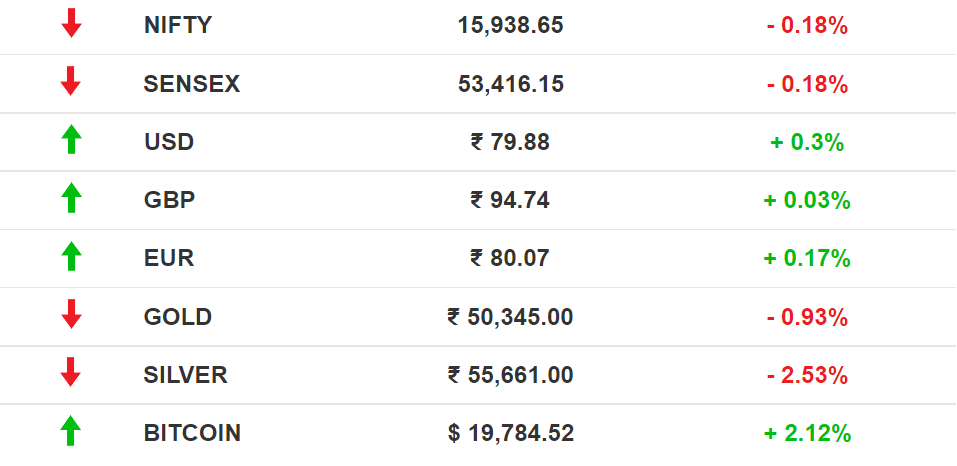Much ado about Nothing
Also in today’s edition: Airlines have staffing problems; TikTok is cooler than Google; Finally, doxxing could be an offense; ED turns up the heat on crypto exchanges
Good morning! Microsoft is selling clothes. Titled Hardwear, the nine-piece collection consists of T-shirts, hats, cargo pants, sweaters, sweatpants, and jackets. Did we mention there's a T-shirt with the Windows XP wallpaper, no less. Of course, the line isn't cheap. Reminds us of Apple retailing a $19 polishing cloth for its wares. You don't really need it.
🎧Hardwear isn't Microsoft's first attempt at clothing. Find out more.
If you enjoy reading us, why not give us a follow at @thesignaldotco on Twitter and Instagram.
The Market Signal*

Stocks: The Indian rupee has slumped to a record low of ₹79.91 against the US dollar. Banking giant JPMorgan posted disappointing numbers for the second quarter. Fears of an aggressive US Fed rate hike coupled with the weakening rupee weighed on domestic benchmark equities.
Early Asia: The SGX Nifty jumped +0.19% higher than its previous close at 7.30 am India time. Nikkei 225 powered on at +0.26%. The Hang Seng Index shrunk -0.87%.
AVIATION
Remuneration Stir Throttles Airlines

Hot on the heels of pilots and cabin crew members, technicians of IndiGo and GoFirst have been calling in sick to protest against low salaries. Following arbitrary terminations and disciplinary action, the airlines claim to be in talks with aggrieved employees.
Burrow in: With the pandemic waning out, employees across airline companies are demanding pre-Covid-19 salaries to be reinstated. Technicians at Indigo were earning merely ₹5,000 to ₹8,000 per month during the pandemic as against ₹18,000 to ₹20,000. So far, there have been only partial rollbacks. The case with GoFirst is no different.
Latest addition: SpiceJet pilots too have jumped on the ‘mass sick leave’ bandwagon over a 70% deduction of pre-pandemic salary. Pilots also claim that the airline has not been depositing their TDS and provident fund since 2020, despite deductions.
TECH
Google’s Oldest Product Has A Gen Z Problem
TikTok and Instagram are giving Google's flagship products—Search and Maps—a tough time. The tech giant says so.
Say, what? Google’s search engine is no more the go-to for life’s existential questions or irreverent queries—at least for a certain demographic. The so-called Gen Z, is now looking to TikTok and Instagram for…search. Google’s 25-year-old search engine now has plans to go younger.
Crosshairs: This potentially could pose a problem for the tech giant. Amazon is already the Google of product search. TikTok did dethrone Google as the most-visited website last year. Even Queen Bey presented her music catalog on TikTok.
Counterpoint: Recently, Google even proposed hiving off its ad-tech business to avoid an anti-trust lawsuit. YouTube is the second largest search engine after Google. Putting the spotlight on TikTok may just help it turn down the antitrust heat, something of an old trick among American businesses.
CREATOR ECONOMY
It’s Nothing, Really

Creators are an integral part of the attention economy and wield tremendous influence and clout because of their popularity. They can also wreak havoc over nothing.
Much ado about nothing: Former OnePlus founder Carl Pei-led ‘Nothing’ launched its first handset, the quirklily named and designed Phone 1. The much-awaited semi-transparent phone which Pei called retro-futuristic was vied for to be reviewed first. A Telugu language YouTuber, unhappy that he had not received a review unit, uploaded a mock unboxing video that contained a faux note saying “not for South Indians”. A screenshot of it went viral, igniting regionalist sentiments and trending #DearNothing and #BoycottNothing.
A response from Nothing: After backlash over literally nothing, Nothing India head responded, calling the fake unboxing and letter unacceptable. He said the scorned creator was actually in line to receive the device.
The Signal
In many south Indian states, fans and followers are often so besotted with film stars that they literally go to war at the slightest affront to their demigods. The Nothing incident shows how modern communication tech allows even those with much less popularity to weaponise their following. Last year, two YouTube travelogue creators in Kerala reportedly refused to pay tax for their modded vehicle.
For brands, creators are a double-edged necessity. Meesho was once at the receiving end. Others have complained of unreasonable demands. If Nothing’s experience is anything to go by, companies would need to have a creator-relations strategy.
🎧 Influencers are bullying companies and brands are getting hurt. Listen now.
TECH POLICY
Doxxing Could Land You In Jail Soon
The Indian government is seeking to clamp down on digital practices such as doxxing and “deliberate misinformation,” the Indian Express reported. It will outlaw such practices in a new legislation that will replace the existing IT Act of 2000. Internally, the said legislation is called the “Digital India Act.”
Why now? Doxxing, or the act of publishing someone’s personal and private information online, is now commonplace, especially on hyperpolarised social media platforms. Deliberate misinformation, though is a little more complicated, since India doesn't have a “fake news” law currently, except for defamation laws.
What else? The law, currently in a “draft layout” stage, also seeks to ensure algorithmic accountability of social media platforms, besides having “provisions to ensure net neutrality and data privacy.”
CRYPTOCURRENCY
Woes Pile Up For Crypto Exchanges
The ED has revealed that at least 11 crypto exchanges in India have helped transactions from other countries on their platforms without complying with KYC regulations and anti-money laundering norms.
Why it’s important: Such violations can erode the confidence of regulating and policing agencies in crypto exchanges. It also breached the forex rules by not filing all the investments from global VC firms such as Tiger Global, Sequoia in the last three years under the RBI’s foreign currency-gross provisional return filing.
Doomed: Celsius Network has filed for bankruptcy protection, a month after freezing customer assets amid the ongoing turbulence in the crypto market. This follows the crypto exchange Voyager Digital and crypto hedge fund Three Arrows’s bankruptcy filing.
FYI
Tougher nut: Cracking chartered accountancy entrance is going to be tougher as ICAI is going to raise the qualifying percentage and the curriculum will have more technology and data analytics.
Mind your language: The Lok Sabha secretariat has issued a booklet of words that will be considered unparliamentary in both, the Lok Sabha and Rajya Sabha. Terms such as jumlajeevi, corrupt, drama, and hypocrisy have made it to the list.
Concerning: India’s first Monkeypox case has been detected in Kerala’s Kollam district. The case is a patient who travelled from the UAE earlier this week.
Late entry: B2B startup Udaan is the latest entrant in the race to acquire Metro AG’s India business. Others in the fray include Reliance and Thailand's Charoen Pokphand Group.
See you in court: Over 550 women passengers across the US have dragged Uber to court over allegations of assault by drivers on the platform. The allegations include kidnapping, sexual assault, sexual battery, rape, stalking, and other forms of harassment.
Calling it quits: Sri Lanka President Gotabaya Rajapaksa finally sent his resignation via email after landing in Singapore. Italy’s Prime Minister Mario Draghi too resigned following cracks in his ruling coalition.
Probes: Italy has launched an antitrust investigation against Google over interoperability concerns. Amazon is looking to settle two antitrust cases in Europe over its use of non-public seller data and its buy box feature.
FWIW

In hot water: Your footlong tuna sub probably is stuffed with all that jazz but tuna. A US federal judge has announced that Subway can be sued for misleading customers over its "100% tuna" claim. The chain denies these claims. Shady.
Gloves off: Top Glove was once the world’s largest medical glove maker, thanks to the Covid-19 pandemic. But their fortunes have now taken a tumble. Last month, it lost after its shares tumbled 89%. The net worth of its founder has dropped to $1 billion.
Unsavory makeover: New Oriental Education and Technology Group was once an ed-tech start-up. We say once, because, it’s pivoted to becoming a fresh food and daily groceries service. English tutors are now pimping fresh produce online. China wanted to curb rising education costs in an attempt to encourage couples to have children. This ed tech became one of the many victims.
Want to advertise with us? We’d love to hear from you.
Write to us here for feedback on The Signal.



